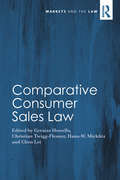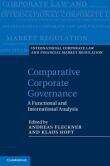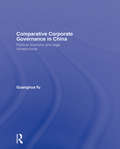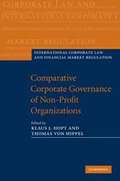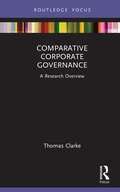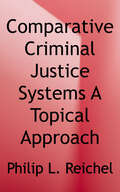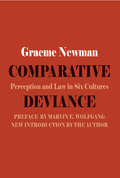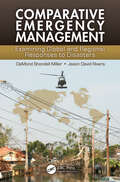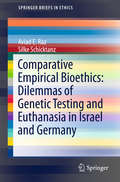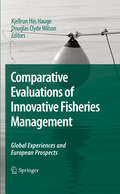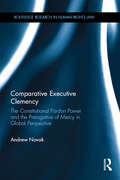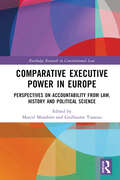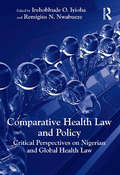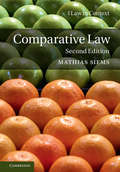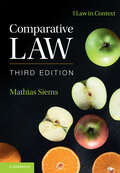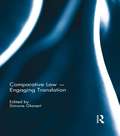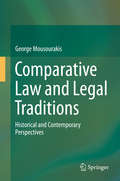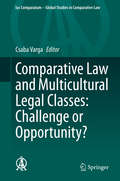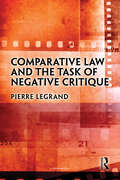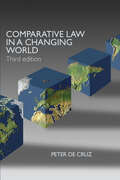- Table View
- List View
Comparative Consumer Sales Law (Markets and the Law)
by Christian Twigg-Flesner Geraint Howells Hans-W. Micklitz Chen LeiFor many years, legislators around the world have responded to the particular needs of consumers by introducing dedicated rules for consumer sales contracts. In the European Union, a significant push came through the adoption of the Consumer Sales Directive (99/44/EC). Elsewhere in the world, legislation focusing on consumer sales contracts has been introduced, for example in New Zealand and Australia. This book offers a snapshot of the current state of consumer sales law in a range of jurisdictions around the globe. It provides both an overview of the law in selected jurisdictions and compares the application of these rules in the context of two case scenarios.
Comparative Contract Law: An Introduction
by Ermanno CalzolaioNational legal systems have their own principles and rules on contract law. The trans-nationalization of trade and legal practice involves acting in the context of legal diversity. This book provides an introductory overview of the main issues of contract law from a comparative perspective, focusing on the legal traditions of civil law and common law. Featuring short theoretical overviews, followed by cases selected from various jurisdictions, the book shows the concrete application of the principles and rules involved. Civil law and common law represent two different models of dealing with contract law issues. The book focuses on the French, German, and Italian experiences and on the English legal system, the latter being the main source of inspiration for other common law countries, with some significant exceptions. Topics covered include the structure of contract law and the rules about its formation and interpretation, the role of pre-contractual negotiations, the consequences of mistakes, and breach and supervening events (including the impact of the Covid-19 pandemic). Readers will learn about common problems that are faced when contracting with parties coming from different jurisdictions, whilst also acquiring a deeper understanding of the approach of their own legal system. This book will be key reading for undergraduate and postgraduate students of comparative contract law, and contract law more generally.
Comparative Corporate Governance
by Klaus J. Hopt Andreas M. Fleckner#"This book has grown out of a conference entitled 'Comparative Corporate Governance, an International Conference, United States-Japan-Western Europe' which was held in Brussels on 14 June 1995"--Pref.
Comparative Corporate Governance in China: Political Economy and Legal Infrastructure
by Guanghua YuAn insightful overview of the political, legal and social perspectives which inform corporate governance in China, this book examines the challenges of corporate governance faced by Chinese corporations and international corporations operating in China. Unlike other texts that tend to focus solely on the board of directors and the takeover market, Yu has enlarged the scope of this study to cover both market forces and contractual mechanisms, providing readers with an extended and comprehensive discussion of the pertinent issues. It explores a range of issues and their role in corporate governance models, including: executive compensation takeover markets the securities market insolvency issues venture capital market Examining the current climate and making the case that comparative corporate governance studies have significant policy implications for China’s transitional economy, Yu has put together a book that is a valuable resource for students and those working in Asian business, corporate governance and commercial law.
Comparative Corporate Governance of Non-Profit Organizations
by Klaus J. Hopt Thomas Von HippelThe economic importance of the non-profit sector is growing rapidly in the USA and Europe. However, the law has not kept abreast with its development. The European Court of Justice has extended certain freedoms of the EC Treaty to non-profit organisations, and more case law is expected to follow in the near future, but the observations, theories, solutions and legal and non-legal rules in this field are manifold. The chances of harmonising the law on a European level are slim. Despite these differences, a common core of international corporate governance problems and regulatory solutions can be seen. This volume of essays brings together a variety of international experts from both corporate governance and governance of non-profit organisations to compare the two areas and explore the lessons that can be learned regarding comparative corporate governance for non-profit organisations.
Comparative Corporate Governance: A Research Overview (State of the Art in Business Research)
by Thomas ClarkeCorporate governance developed to maintain the accountability, stability, and performance of corporations. It has evolved to concern not just the financial health of the company, but its social and environmental impact. There is considerable international institutional diversity in corporate governance. The role and significance of market institutions varies among different governance systems. This work provides a concise insight into the defining impulses of late twentieth- and early twenty-first-century corporate governance evolving through a series of competing epoch-making paradigmatic contests. The present paradigm highlights a shift towards corporate sustainability involving the corporate delivery of long-term value in financial, social, environmental, and ethical terms. In analysing the purpose of the company and the definition of value creation, the hegemony of agency theory and shareholder primacy is challenged. More expansive theoretical explanations are considered which recognise the deeper values companies are built upon, the wider purposes they serve, and the broader set of relationships they depend upon for their success. This book will be of value to researchers, scholars, and students in corporate governance, sustainability, business, and accounting. Managers, professionals, and other general business readers will also find this text of interest.
Comparative Criminal Justice Systems
by Jay S. Albanese Harry R. DammerOffering a comprehensive analysis, bestselling COMPARATIVE CRIMINAL JUSTICE SYSTEMS, 5e compares the various criminal justice systems throughout the world using six model countries: China, England, France, Germany, Japan, and Saudi Arabia. <p><p>The book illustrates the different types of law and justice systems while exploring the historical, political, economic, social, and cultural influences on each system. It examines important aspects of each type of justice system--common law, civil law, socialist law, and sacred (Islamic) law--to highlight the similarities and differences of each. Completely up to date, it provides expanded coverage of such high-profile topics as human trafficking, Internet pornography, identity theft, transnational policing, terrorism and more.
Comparative Criminal Justice Systems: A Topical Approach
by Philip L. ReichelComparative Criminal Justice Systems: A Topical Approach is designed to effectively explain the complexities of justice systems around the world. <p><p>Using an accessible, easy-to-understand comparative approach, it helps students recognize the growing importance of an international perspective. Key concepts are organized in a sequence that many students will already find familiar, progressing from issues concerned with criminal law to examinations of police, courts, and corrections. Students gain a realistic understanding of the many ways policing, adjudication, and corrections systems can be organized and operated. <p><p>Unlike most competitive books, it covers more than 30 countries, offering insights into such issues as Islamic legal tradition and the Eastern Asia legal tradition. Learning Objectives utilize Bloom's taxonomy phrasing to ensure clarity, usefulness, and accessibility, and visually appealing images further add to the book's readability. <p><p>The Seventh Edition updates statistics, changes in law, and modifications of procedures throughout; includes new and updated topic coverage enhances and updates popular pedagogical features; and provides a number of important chapter modifications to ensure readers are getting the most useful information on this constantly growing field.
Comparative Deviance: Perception and Law in Six Cultures
by Marvin E. Wolfgang Graeme R. Newman"Comparative Deviance" represents a systematic attempt to survey public perceptions of deviant behavior cross-culturally: in India, Indonesia, Iran, Italy, Yugoslavia and the United States. There is extensive diversity in both law and perception concerning such deviances as taking drugs, homosexuality, and abortion, yet there is evidence for a basically invariant structure in perception of deviance across all cultures. Within the countries studied in this volume, Geraeme Newman discovers that the strength of religious belief and urban rural background accounted for major differences in the perception of deviance - when differences were identified.Contrary to popular academic opinion in the United States, Newman finds that those countries with the most liberal laws on deviance (i.e., the least punitive sanctions) are also those highly economically developed and least totalitarian (United States and Italy). But when public opinion is considered, the public favors harsher punishments than the law provides. In contrast, in the developing countries of India, Iran and Indonesia, where penal sanctions are more severe, public opinion is much more liberal. The crucial question is the role criminal law plays in the process of modernization: whether law is a stable cultural influence, round which public opinion wavers in a startling fashion, depending on the stage of modernization.These findings challenge many assumptions of conflict theory in sociology, of cultural relativism in anthropology, and of ethical relativism in moral philosophy. All findings are examined in relation to research on modernization, social development, and the evolution of law. These fundamental issues are thus important to many different disciplines across the board.
Comparative Emergency Management: Examining Global and Regional Responses to Disasters
by Jason David Rivera DeMond Shondell MillerA host of natural and man-made disasters have plagued the world in the twenty-first century, many with significant global impact. The Deepwater Horizon Oil Spill, the Indian Ocean tsunami, and Hurricane Katrina all affected broad regions with devastating results. The need for better emergency management policies, procedures, and cooperation among n
Comparative Empirical Bioethics: Dilemmas of Genetic Testing and Euthanasia in Israel and Germany (SpringerBriefs in Ethics)
by Aviad E. Raz Silke SchicktanzThis book is a comprehensive, empirically-grounded exploration of the relationship between bioethics, culture, and the perspective of being affected. It provides a new outlook on how complex bioethical issues become questions of everyday life. The authors focus on two contexts, genetic testing and end-of-life care, to locate and demonstrate emerging themes of responsibility, such as self-responsibility, responsibility for kin, and the responsibility of society. Within these themes, the duty to know versus the right not to know one's genetic fate (in the context of genetic testing), or the sanctity of life versus self-determination (in the context of end of life care) are identified as culturally embedded dilemmas that are very much relevant for lay persons. Furthermore, cultural factors such as religion, history, utopian and dystopian views of biomedical technologies, outlooks on the body and on health/illness, and citizenship are examined. Health issues are increasingly becoming a question of assessing risk and responsibility: How can we better prepare ourselves for the future? We all make such assessments in a way that combines personal inclinations, professional recommendations, and cultural framings. There is still much to be learned about the interplay between these three dimensions. "
Comparative Evaluations of Innovative Fisheries Management: Global Experiences and European Prospects
by Kjellrun Hiis Hauge Douglas Clyde WilsonComparative Evaluations of Innovative Fisheries Management begins with a look at four places outside the European Union known for innovative management: New Zealand, Nova Scotia, Alaska and Iceland. Then the focus shifts to the success criteria related to specific disciplines including biological and social robustness, economic efficiency and impacts on management costs. Hypotheses are tested using data capable of generating useful results. The main conclusions include a retrospective of how key concepts defined and represented the various perspectives, skills and backgrounds that made up the multidisciplinary CEVIS project.
Comparative Executive Clemency: The Constitutional Pardon Power and the Prerogative of Mercy in Global Perspective (Routledge Research in Human Rights Law)
by Andrew NovakVirtually every constitutional order in the common law world contains a provision for executive clemency or pardon in criminal cases. This facility for legal mercy is not limited to a single place in modern legal systems, but is instead realized through various practices such as a law enforcement officer’s decision to arrest, a prosecutor’s decision to prosecute, and a judge’s decision to convict and sentence. Doubts about legal mercy in any form as unfair, unguided, or arbitrary are as ubiquitous as the exercise of mercy itself. This book presents a comparative analysis of the clemency and pardon power in the common law world. Andrew Novak compares the modern development, organization, and practice of constitutional and statutory schemes of clemency and pardon in the United Kingdom, United States, and Commonwealth jurisdictions. He asks whether the bureaucratization of the clemency power is in line with global trends, and explores how innovations in legislative involvement, judicial review, and executive consultation have made the mercy and pardon procedure more transparent. The book concludes with a discussion on the future of the clemency and pardon power given the decline of the death penalty in the Commonwealth and the rise of the modern institution of parole. As a work concerned with the practice of mercy in the common law world, this book will be of great interest to researchers and students of international and comparative criminal justice and international human rights law.
Comparative Executive Power in Europe: Perspectives on Accountability from Law, History and Political Science (Routledge Research in Constitutional Law)
by Guillaume Tusseau Marcel MorabitoThis book provides an up-to-date interdisciplinary assessment of the accountability of executive power in different European States and at the European Union level. From a legal perspective, it wonders to what extent the forms of responsibility and accountability of executive power have evolved in terms of legal technique or framework. From a historical perspective, it looks at the evolution of responsibility paradigms. From a political science perspective, it examines responsibility and the expectations of European democracies in terms of authority and efficiency. The volume also has a quantitative aspect identifying, gathering and analysing statistical material on responsibility and accountability in current political regimes. The book will be a valuable resource for researchers, academics, and policy-makers in constitutional law and politics, public law, comparative law, comparative politics, legal history and government.
Comparative Health Law and Policy: Critical Perspectives on Nigerian and Global Health Law
by Irehobhude O. Iyioha Remigius N. NwabuezeHealth law and policy in Nigeria is an evolving and complex field of law, spanning a broad legal landscape and drawn from various sources. In addressing and interacting with these sources the volume advances research on health care law and policy in Nigeria and spells the beginning of what may now be formally termed the ’Nigerian health law and policy’ legal field. The collection provides a comparative analysis of relevant health policies and laws, such as reproductive and sexual health policy, organ donation and transplantation, abortion and assisted conception, with those in the United Kingdom, United States, Canada and South Africa. It critically examines the duties and rights of physicians, patients, health institutions and organizations, and government parastatals against the backdrop of increased awareness of rights among patient populations. The subjects, which are discussed from a legal, ethical and policy-reform perspective, critique current legislation and policies and make suggestions for reform. The volume presents a cohesive, comparative, and comprehensive analysis of the state of health law and policy in Nigeria with those in the US, Canada, South Africa, and the UK. As such, it provides a valuable comparison between Western and Non-Western countries.
Comparative Healthcare Law
by Peter De CruzThis book provides a comparative and accessible analysis of key areas of healthcare law, comparing English law with selected common and civil law jurisdictions within a framework of law and medical ethics, and encompassing pivotal cases, codes and legislation. The introduction examines medical decision making, and legal and ethical frameworks in Western and non-Western cultures. Part I examines healthcare law in England and Wales, including abortion, consent, confidentiality, children, euthanasia, persistent vegetative state patients, organ transplantation, sterilisation of the mentally incapacitated, surrogacy, UK cloning proposals and the landmark conjoined twins case. Part II covers non-English common law jurisdictions such as Australia, New Zealand, Ireland and certain American jurisdictions. Civil law examples focus on France and Germany, and, where appropriate, Scandinavian countries. International perspectives on abortion laws and euthanasia are also provided. The book concludes with a comparative overview, which highlights common healthcare themes across various jurisdictions. Comparative Healthcare Law brings together information never previously accessible within the covers of one volume, making this unique book indispensable for scholars and practitioners in the field of healthcare law.
Comparative Issues in the Governance of Research Biobanks: Property, Privacy, Intellectual Property, and the Role of Technology
by Umberto Izzo Matteo Macilotti Giovanni PascuzziIn the last few years, the boom in biobanking has prompted a lively debate on a host of interrelated legal issues, such as the Gordian knot of the ownership of biological materials, as well as privacy concerns. The latter are due to the difficulty of accepting that biological samples must be completely anonymous without making it practically impossible to exploit their information potential. The issues also include the delicate role and the changing content of the donor's "informed consent" as the main legal tool that may serve to link the privacy and property interests of donors with the research interests and the set of principles that should be at the core of the biobanking practice. Lastly, the IP issues and the patentability of biological samples as well as the protection of databases storing genetic information obtained from the samples are covered. Collecting eighteen essays written by eminent scholars from Italy, the US, the UK and Canada, this book provides new solutions to these problems. From a comparative viewpoint, it explores the extent to which digital technology may assist in tackling the numerous regulatory issues raised by the practice of biobanking for research purposes. These issues may be considered and analyzed under the traditional paradigms of Property, Privacy, Informed Consent and Intellectual Property.
Comparative Law
by Mathias SiemsAs attention moves rapidly towards comparative approaches, the research and teaching of company law has somehow lagged behind. Existing books on comparative company law focus on the institutional structure of the corporation, but this approach risks overlooking specific cases and how different jurisdictions might treat each of these cases. For example, directors' liability and shareholder duties can best be understood by analyzing how selected hypothetical cases would be solved in different countries. The overall purpose of this book is therefore to fill a gap in the academic literature by identifying whether conceptual differences between countries exist. The book also has a public policy dimension, because the existence or absence of differences may lead to the question of whether formal harmonization of company law is necessary. The book covers ten legal systems. With respect to countries of the European Union, it focuses on the most populous countries (Germany, France, the UK, Spain, Italy, and Poland) as well as two smaller Member States (Finland and Latvia). In addition, the laws of the world's largest economies (the US and Japan) are included for the purposes of wider comparison. From a comparative perspective, the US is the most important 'exporter' of corporate governance theories and ideas and Japan's company law is considered a good modern example of a mixed jurisdiction. The book will be essential reading for company law students wishing to enhance their studies from a global and comparative perspective.
Comparative Law ( Law in Context)
by Mathias SiemsComparative Law offers a thorough grounding in the subject for students and scholars of comparative law alike, critically debating both traditional and modern approaches to the subject and using examples from a range of legal systems gives the reader a truly global perspective. <P><P>Covering essential academic debates and comparative law methodology, its contextualised approach draws on examples from politics, economics and development studies to provide an original contribution to topics of comparative law. This new edition: is fully revised and updated throughout to reflect contemporary research, contains more examples from many areas of law and there is also an increased discussion of the relevance of regional, international, transnational and global laws for comparative law. Suitable for students taking courses in comparative law and related fields, this book offers a fresh contextualised and cosmopolitan perspective on the subject.<P> Revised and updated throughout to reflect contemporary research.<P> Further practical examples illustrate how the subject can be applied.<P> Offers a global perspective by referencing various legal systems Includes online supplement, available at http://www.comparinglaws.blogspot.com
Comparative Law (Law in Context)
by Mathias SiemsComparative Law offers a thorough grounding in the subject for students and scholars alike, covering essential academic discussions and comparative law methodology. It critically debates both traditional and modern approaches to the discipline and uses examples from a range of jurisdictions to give the reader a truly global perspective. Its contextualised and interdisciplinary approach draws on examples from politics, economics and other social sciences to provide an original contribution to topics of comparative law. This new third edition is fully revised to reflect developments in the scholarship and includes two new chapters, balancing the book's structure between comparative law of the past, present and future. Suitable for students taking courses in comparative law and related fields, this book offers a fresh and cosmopolitan perspective on the subject.
Comparative Law - Engaging Translation
by Simone GlanertIn an era marked by processes of economic, political and legal integration that are arguably unprecedented in their range and impact, the translation of law has assumed a significance which it would be hard to overstate. The following situations are typical. A French law school is teaching French law in the English language to foreign exchange students. Some US legal scholars are exploring the possibility of developing a generic or transnational constitutional law. German judges are referring to foreign law in a criminal case involving an honour killing committed in Germany with a view to ascertaining the relevance of religious prescriptions. European lawyers are actively working on the creation of a common private law to be translated into the 24 official languages of the European Union. Since 2004, the World Bank has been issuing reports ranking the attractiveness of different legal cultures for doing business. All these examples raise in one way or the other the matter of translation from a comparative legal perspective. However, in today’s globalised world where the need to communicate beyond borders arises constantly in different guises, many comparatists continue not to address the issue of translation. This edited collection of essays brings together leading scholars from various cultural and disciplinary backgrounds who draw on fields such as translation studies, linguistics, literary theory, history, philosophy or sociology with a view to promoting a heightened understanding of the complex translational implications pertaining to comparative law, understood both in its literal and metaphorical senses.
Comparative Law and Legal Traditions: Historical and Contemporary Perspectives
by George MousourakisThe primary aim of this book is to provide clear and reliable information on a number of central topics in comparative law. At a time when global society is increasingly mobile and legal life is internationalized, the role of comparative law is gaining importance. While the growing interest in this field may well be attributed to the dramatic increase in international legal transactions, this empirical parameter is only part of the explanation. The other part, and (at least) equally important, has to do with the expectation of gaining a deeper understanding of law as a social phenomenon and a fresh insight into the current state and future direction of one’s own legal system. In response to the internationalization of legal practice and theory, law schools around the world have expanded their comparative law programs. Within the legal subjects that form the core of the curriculum there is a greater interest in comparative legal analysis, as well as greater attention to how global developments and international actors and institutions affect domestic law. Transnational legal education based on comparative reasoning is intended to help shape a new generation of lawyers, public servants and other professionals who recognize and respect cultural diversity in an interconnected world. The central topics discussed in this book include: the nature and scope of comparative legal inquiries; the relationship of comparative law to other fields of legal study; the aims and uses of comparative law; the origins and historical development of comparative law; and the evolution and defining features of some of the world’s predominant legal traditions. It also deals with selected theoretical aspects, such as the problem of comparability of legal events; the classification of legal systems into families of law; and the topics of legal transplants, harmonization and convergence of laws. Chiefly intended for students, the book also discusses a number of fundamental issues concerning the development of comparative law, and devotes certain sections to reviewing the salient features of the relevant literature on definitional, terminological, methodological and historical issues.
Comparative Law and Multicultural Legal Classes: Challenge or Opportunity? (Ius Comparatum - Global Studies in Comparative Law #46)
by Csaba VargaThis book discusses legal education in multicultural classes. Comparative law education is now widespread throughout the world, and there is a growing trend in developed countries toward teaching global law. Providing theoretical answers on how to describe each legal culture and tradition side-by-side, it also explores educational methodological options to address these aspects without causing offence or provoking tension within a multicultural student community. The book examines nine countries on three continents, bringing together academic views and educational insights from ten scholars in the field of comparative law.
Comparative Law and the Task of Negative Critique
by Pierre LegrandThis book’s essays seek to cleanse comparative law of some of the epistemic detritus it has been collecting and that has been cluttering its theory and practice to the point where this flotsam has effectively stultified ‘good’ comparison. While a critique would pursue adjustments to the prevailing model, this text’s negative critique seeks a much more radical refurbishment as it utters an emphatic ‘no’ to the governing epistemology: it pursues, in effect, a deposition and a disposition of the leading epistemic configuration and the various assumptions regarding the acquisition of knowledge about foreign law that inform it. Negative comparative law thus operates at a primordial level inasmuch as it concerns the matter of justice: it aims to do justice to foreign law as foreignness finds itself appropriated and travestied by comparatists for ideological purposes. In the process, negative critique purports significantly to enhance comparative law’s institutional, intellectual, and ethical respectability. This book will benefit all law teachers and postgraduate law students interested in the workings of law on the international scene, whether specialists in comparative law, public international law, private international law, transnational law, or foreign relations law – in particular, individuals bringing to bear a critical inclination to their subject-matter.
Comparative Law in a Changing World
by Peter De CruzProviding a comprehensive and comparative analysis of the legal approach to key areas of law within different legal systems, this book offers a blueprint for comparative legal study by evaluating the current epistemological debate on comparative law and comparative legal research methods.Substantive law, the law of obligations, commercial and corporate law within the major legal systems of the world are all examined and compared. While France and Germany are generally used as the archetypal civil law jurisdictions and English law as the main common law comparator, this third edition also examines the Russian Federation in the post-Soviet era and socialist legal influences as well as non-Western legal traditions. Fully updated and revised to include all recent developments, this edition also includes a broad historical introduction and outlines changes in EC Law.It assesses the possibility of Europeanization of national legal systems and certain legal topics, the impact of the globalization of legal institutions and the evolving 'new world order' in the early twenty-first century.Written in a clear, user-friendly style, Comparative Law in a Changing World is an accessible source for undergraduates and postgraduates wishing to trace the influence of common law and civil law legal traditions on jurisdictions across the world.
